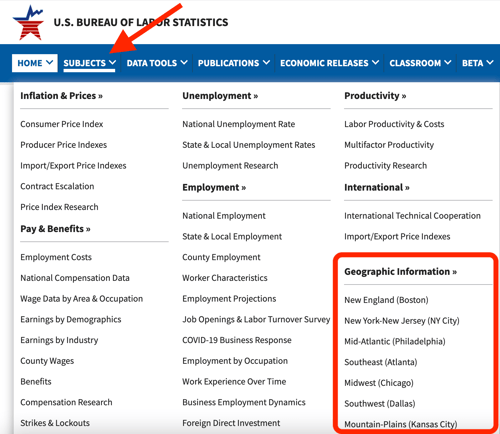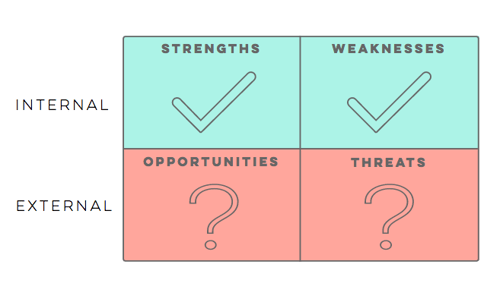Businesses have never been more agile than they are right now. Bringing a product to market, releasing a new feature, launching an ad campaign — these initiatives, though they will never be easy by any means, are not as daunting as they once were.
As markets become more crowded and pivots become more frequent, investments in competitive intelligence (CI) are growing like never before.
NEED COMPETITIVE INTELLIGENCE BEST PRACTICES? USE OUR FREE TOOL >>
This makes sense; as the intensity of competition climbs, businesses increase their CI investments in order to … remain competitive. That, of course, is the overarching goal.
But what are the specific goals of competitive intelligence? In what specific ways does an investment in CI enable you to succeed?
If these questions are on your mind, you’ve come to the right place.
5 major goals of competitive intelligence
The following non-exhaustive list was written in alignment with the five major competitive intelligence stakeholders: sales, marketing, product management, customer success, and executive leadership. Today, we’ll discuss one goal per stakeholder.
With that being said, please note that there is plenty of overlap between stakeholders. Improved market positioning can translate into more deals, and an improved product roadmap can translate into higher rates of customer retention. We’ve aligned each goal with a unique stakeholder in order to emphasize the breadth of the impact of CI, but this is not to suggest that each stakeholder cares about one thing and one thing only.
1. Win deals
Getting a prospective buyer to choose your product or service over a laundry list of alternatives is no easy task. In order to make it happen — and make it happen consistently — sales reps need to be well-versed in the art of communicating differentiated value — i.e., they need to routinely convince prospects that your solution brings something truly unique to the table (assuming that is, in fact, the case).
That’s impossible in the absence of competitive intelligence. If you know next to nothing about your competitors’ products or services, how are you supposed to convincingly argue that yours is the best option?
By empowering your reps with the insights they need to consistently win deals, competitive intelligence can help your business succeed.
2. Improve market positioning
Let’s take a step back for a moment. Before one of your reps can have the opportunity to seriously engage with a prospective buyer, that prospect needs to feel as if there’s a legitimate reason to evaluate your solution. Unless they’re extraordinarily bored, no prospect is going to give a salesperson the time of day until they see something in your company.
That something is, in large part, the product of your marketing team. Much like sales reps, marketers are responsible (among other things) for convincing prospects that your solution brings something truly unique to the table. A key difference, of course, is that your marketing team tends to touch a wider range of funnel stages than your sales team does.
It’s through positioning that marketers — specifically product marketers — establish the differentiated value of your solution. Again, competitive intelligence is essential; when you’re unfamiliar with your competitors, you’re ill-equipped to earn the attention of your prospects.
By empowering your marketers with the insights they need to improve market positioning, competitive intelligence can help your business succeed.
3. Optimize product roadmaps
Up until this point, we’ve been focused on the communication of value — a business function handled primarily by your sales and marketing teams.
But what about the creation of value? Who’s in charge of making sure that your reps and marketers are telling the truth when they advertise your solution as the best in the industry?
That would be your product management team — the folks responsible for (1) figuring out what to build and (2) building it. More precisely, product managers are tasked with creating and executing a product roadmap that differentiates your solution from its alternatives — i.e., ensuring that your solution actually brings something unique to the table.
You already know what I’m going to say, right? Product managers cannot do their jobs properly in the absence of competitive intelligence. When you’re unfamiliar with your competitors, you’re ill-equipped to create something that stands out from the pack.
By empowering your product managers with the insights they need to optimize your product roadmap, competitive intelligence can help your business succeed.
4. Retain customers
When you’re in a competitive market, the acquisition of a new customer is cause for celebration. Between sales, marketing, and — albeit indirectly — product management, it takes a tremendous team effort to create and close a deal in the context of intensifying competition.
But just because you’ve acquired a customer does not mean you’ve insulated them from your competitors. That you’ve secured a yearlong or even a multi-year contract means little to the other companies in your market — they still want that customer’s business. It may not happen immediately, but you better believe that new customer of yours will be hearing from at least one of your competitors in the not-so-distant future.
This, of course, is why you have a customer success team — to ensure that your customers continue to be your customers. Among many other things, customer success reps need to be prepared to respond in an effective manner when one of their accounts voices an interest in exploring alternative solutions in the market.
Competitive intelligence plays a critical role in these situations. CS reps with a strong understanding of your competitive landscape are well-equipped to prove to their accounts that your solution is still the best available option.
By empowering your CS reps with the insights they need to retain customers, competitive intelligence can help your business succeed.
5. Inform long-term business strategy
All the while — as sales reps win deals, marketers improve positioning, product managers optimize roadmaps, and CS reps retain customers — executive leaders work to produce and implement long-term business strategy.
Note that this responsibility extends far beyond the scope of product strategy (although that is the primary focus for someone in the position of VP Engineering or Chief Product Officer). In addition to helping their direct reports do their jobs as effectively as possible, executive leaders work to answer questions like these:
- How are we going to continuously grow revenue and market share over the long term?
- Are there adjacent markets we can break into? If so, what do those markets look like?
- In what ways are we at risk? What can we do to shield ourselves from those factors?
The role of competitive intelligence in answering these questions may not be obvious, but it is undeniable. You can’t make a plan to grow market share without understanding who your competitors are and how they’ve positioned themselves in the eyes of prospective buyers. Similarly, you can’t make a plan to break into an adjacent market without understanding who your competitors would be. And finally, you can’t make a plan to mitigate risks without understanding the ways in which your competitors are poised to exploit your weaknesses.
By empowering your executive leaders with the insights they need to produce and implement long-term strategy, competitive intelligence can help your business succeed.
Revenue is the ultimate goal of competitive intelligence
Competitive intelligence is an investment, and just like any other investment, it’s only worthwhile insofar as it yields a return. Through each of the five avenues we’ve explored here today, CI does, in fact, yield a return — and we’ve got the data to back it up.
According to the latest edition of the State of Competitive Intelligence Report, 61% of businesses have seen revenue growth as a direct result of their investment in CI. Amongst businesses with advanced CI programs — that is, businesses that are fully capitalizing on the potential of CI — that figure jumps to 83%.
The takeaway is clear: Embrace competitive intelligence and you’ll be rewarded with positive results on the bottom line.

Seeing is believing! Check out Crayon for yourself.
Take a Product TourRelated Blog Posts
Popular Posts
-
 The 8 Free Market Research Tools and Resources You Need to Know
The 8 Free Market Research Tools and Resources You Need to Know
-
 6 Competitive Advantage Examples From the Real World
6 Competitive Advantage Examples From the Real World
-
 How to Create a Competitive Matrix (Step-by-Step Guide With Examples + Free Templates)
How to Create a Competitive Matrix (Step-by-Step Guide With Examples + Free Templates)
-
 24 Questions to Consider for Your Next SWOT Analysis
24 Questions to Consider for Your Next SWOT Analysis
-
 How to Measure Product Launch Success: 12 KPIs You Should Be Tracking
How to Measure Product Launch Success: 12 KPIs You Should Be Tracking



